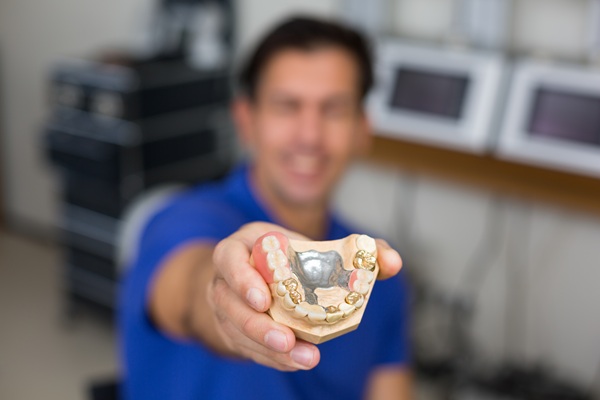Can the Wrong Adhesive Lead to Denture Damage?

Are you looking for more information about denture adhesives? When you need to wear dentures so you can achieve good oral health, it is important to understand everything there is to know about dentures, including proper denture care. Denture care also includes potentially wearing denture adhesives.
An overview of denture adhesives
According to the Food and Drug Administration, in most cases, properly fitted and maintained dentures should not require the use of denture adhesives. However, that does not mean denture adhesives cannot be helpful to certain patients. While only some denture wearers need to use an adhesive, many choose to do so for some additional security, as they want dentures to stay on their own. There are a few different types of adhesives, such as gels, pastes, and powders.
How do denture adhesives work?
Denture adhesives work by applying the adhesive to the dentures and then placing the dentures on the gums. Adhesives make it so that the dentures stay more securely in place. This film of gel, paste, or powder creates a layer between the dentures and the gums, making it much more difficult for them to move or shift around in the mouth.
Who benefits from using adhesives?
When someone gets new dentures, and they fit properly, there is often little to no need for them to use any type of denture adhesive. However, if the patient's mouth begins to change, it may be in their best interest to consider using an adhesive to keep their dentures securely in place.
Changes within the mouth are considered normal when someone loses most or all of their teeth, as the tooth roots that fully support the jawbone are no longer there. Unlike dental implants, traditional dentures do not stimulate the jawbone, leading to oral and facial changes. Since dentures that do not fit properly can cause sore spots and even injury, many people use denture adhesives to keep them in place and prevent irritation.
Can the use of the wrong adhesive cause damage to dentures?
Not necessarily, denture adhesives are specifically made to be used with dentures, so, for the most part, they will not cause any damage to dentures. However, there are a few important things denture wearers should know before choosing to use an adhesive. They are as follows:
- Adhesives should be used according to instructions and in moderation.
- They also need to be completely removed from the dentures on a daily basis.
- When extended uses of adhesives are used, it is essential to undergo periodic assessments by a dental professional.
Can we help you?
Want to understand more about denture damage? The last thing you want to happen when you get new dentures is for them to somehow become damaged. Since it is possible to damage dentures, it is important to understand how to properly care for dentures so they will last for many years. Give us a call today so that we can help you with your dentures.
Request an appointment here: https://myfresnodentist.net or call Complete Dental at (559) 448-9000 for an appointment in our Fresno office.
Check out what others are saying about our dental services on Yelp: Dentures in Fresno, CA.
Related Posts
Tooth loss affects appearance and the ability to chew, speak, and smile with confidence. Fortunately, implant-supported dentures can replace multiple teeth with a natural look and feel. This advanced tooth replacement is also known for its durability, stability, and ability to prevent jawbone loss. A general dentist trained in implant dentistry can help patients understand…
Dental veneers are a popular cosmetic solution for improving the appearance of teeth, offering a natural-looking, durable option for enhancing smiles. However, like any dental restoration, dental veneers can wear out over time or experience damage that may require replacement. Knowing when it is time to replace your dental veneers is crucial for maintaining your…
A smile makeover enhances the appearance of teeth through cosmetic procedures such as veneers, whitening, crowns, and orthodontics. While these treatments improve confidence and aesthetics, maintaining results requires ongoing care. Proper oral hygiene, healthy habits, and routine dental visits ensure long-term success. Understanding how to protect a smile makeover helps preserve its beauty and functionality…
Jaw pain is usually symptomized by throbbing pain. It can start abruptly, or mildly at first and worsen over time. Regardless, the symptoms depend on the origin of the pain. Knowing the causative agent is the first course of action in treating this condition. One of the most common causes of jaw pain is misaligned…


